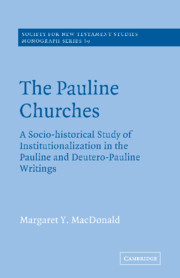 The Pauline Churches
The Pauline Churches The Pauline corpus provides a valuable locus for studying development in the early church, for it contains the earliest writings available to us (Paul's own letters), writings dating from about the beginning of the second century (the Pastoral Epistles) and writings which are characteristic of the ambiguous period following the disappearance of the earliest authorities (Colossians and Ephesians). The main aim of this book has been to trace the process of institutionalization in Pauline communities. The study has investigated the transformation of the early church from its loosely-organized, charismatic beginnings to its more tightly-structured nature in the second century.
Insights from the social sciences have been incorporated throughout the investigation in an effort to comprehend the relationship between the early church writings and their social worlds. Problems with methodologies which posit the shaping of development by the straightforward action of ideas have been highlighted. In order to understand the significance of the transformations in the early church, it is essential to describe the historical circumstances acting as catalysts to change as fully as possible. This means coming to terms with the complexity of social factors which characterize community life. The interplay between the ethos, ministry structures, ritual forms, and beliefs of a community within a Greco-Roman environment must be considered in an investigation of church development.
Understanding development in terms of an ongoing process of institutionalization which results in the construction of a symbolic universe gives an added dimension of realism to historical reconstruction.
To save this book to your Kindle, first ensure [email protected] is added to your Approved Personal Document E-mail List under your Personal Document Settings on the Manage Your Content and Devices page of your Amazon account. Then enter the ‘name’ part of your Kindle email address below. Find out more about saving to your Kindle.
Note you can select to save to either the @free.kindle.com or @kindle.com variations. ‘@free.kindle.com’ emails are free but can only be saved to your device when it is connected to wi-fi. ‘@kindle.com’ emails can be delivered even when you are not connected to wi-fi, but note that service fees apply.
Find out more about the Kindle Personal Document Service.
To save content items to your account, please confirm that you agree to abide by our usage policies. If this is the first time you use this feature, you will be asked to authorise Cambridge Core to connect with your account. Find out more about saving content to Dropbox.
To save content items to your account, please confirm that you agree to abide by our usage policies. If this is the first time you use this feature, you will be asked to authorise Cambridge Core to connect with your account. Find out more about saving content to Google Drive.